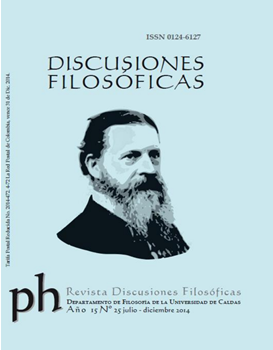Autores/as
Resumen
El presente artículo propone una vía de solución a priori al denominado problema del bootstrapping. Para ello, se considera en primer lugar el dilema enunciado en Cohen (2010) y la consecuencia desastrosa (CD) que de este dilema se deriva. Para evitar la CD, se propone la noción de razonamiento derrotable (defeasible reasoning) cuyas características principales son: (i) a prioridad y (ii) admisión de razones implícitas (RI) no sujetas al problema justificativo a posteriori. Se argumenta que RI es consecuencia de una distinción central entre una lectura débil y fuerte del nexo Sin duda/confíe. Por tanto, RI cumple el rol de descartar el derrotable de modo contingente en una ocasión O.
Palabras clave
Citas
---. “How to Think about Reliability”. Philosophical Topics. 1995: 1-29. Print.
Armstrong, D. M. Belief, Truth and Knowledge. Cambridge: Cambridge University Press, 1973. Print.
Briesen, J. “Reliabilism, bootstrapping, and epistemic circularity”. Synthese. Mar. 2013: 4361-4372. Print.
Cohen, S. “Basic knowledge and the problem of easy knowledge”. Philosophy and Phenomenological Research. Sep. 2002: 309-29. Print.
---. “Bootstrapping, Defeasible Reasoning and A Priori Justification”. Philosophical Perspectives. Jan. 2010: 141-159. Print.
Dancy, J. An Introduction to Contemporary Epistemology. Blackwell: Oxford, 1985/1986. Print.
Douven, I. and D. Kelp. “Proper Bootstrapping”. Synthese. Jan. 2013: 171-185. Print.
Dretske, F. “Conclusive Reasons”. Australasian Journal of Philosophy. May. 1971: 1–22. Print.
Fumerton, R. Metaepistemology and Skepticism. Totowa: Rowman &Littlefield, 1995. Print.
Goldman, A. “Reliabilism”. The Stanford Encyclopedia of Philosophy. 2011.
Luper, S. “The Epistemic Closure Principle”. The Stanford Encyclopedia of Philosophy. 2012.
Pollock, J. “Reliability and Justified Belief”. Canadian Journal of Philosophy. Mar. 1984: 103-114. Print.
Pryor, J. “The Skeptic and the Dogmatist”. Nous. 2000: 517-549. Print.
Ramsey, F. P. “Knowledge”. The Foundations of Mathematics and Other Essays. R. B. Braithwaite (ed.). New York: Harcourt Brace, 1931. Print.
Sosa, E. Reflective Knowledge. Oxford: Oxford University Press, 2009. Print.
Swain, M. Reasons and Knowledge. Ithaca: Cornell University Press, 1981. Print.
Titelbaum, M. “Tell me you love me: bootstrapping, externalism, and no-lose epistemology”. Philosophical Studies. Apr. 2010: 119-134. Print.
Unger, P. “An Analysis of Factual Knowledge”. Journal of Philosophy. Mar. 1968: 157-170. Print.
Van Cleve, J. “Is Knowledge Easy or Impossible? Externalism as the Only Answer to Skepticism”. S. Luper (ed.). The Skeptics. Aldershot: Ashgate, 2003. Print.
Vogel, J. “Reliabilism leveled”. Journal of Philosophy. Nov. 2000: 602-623. Print.
---. “Epistemic Bootstrapping”. Journal of Philosophy. 2008: 518-539. Print.
Wittgenstein, L. On Certainty. Anscombe, G. E. M. and G. H. von Wright (eds.). New York: Harper & Row, 1969. Print.

 PDF
PDF
 FLIP
FLIP





















